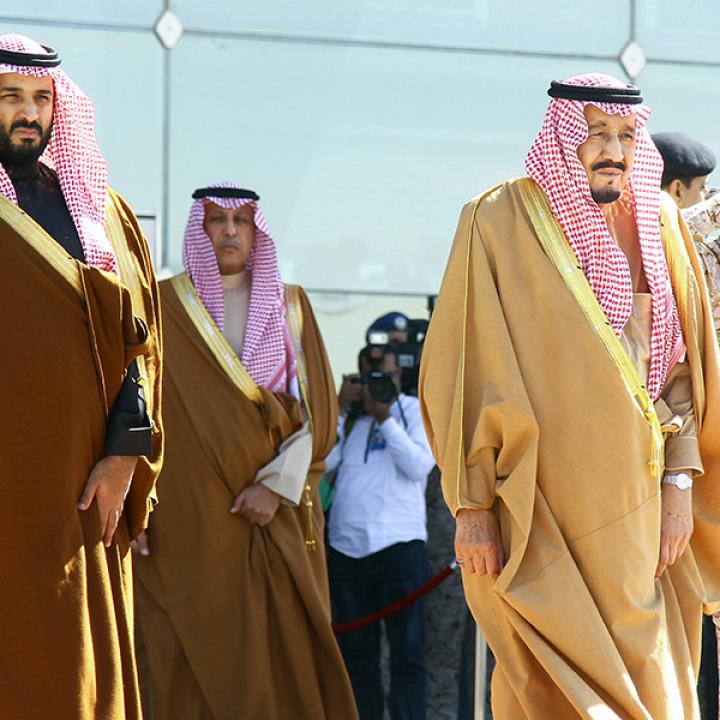

A media revelation about King Salman preparing a video declaring it is time for Muhammad bin Salman to replace him could accelerate changes in order to preempt opposition from other royal quarters.
The leadership of Saudi Arabia, the world's biggest oil exporter and the self-professed leader of the Islamic and Arab worlds, is in the midst of radical, and perhaps contested, change. The thirty-one-year-old crown prince, Muhammad bin Salman (MbS), who is already king all but in name, could take the throne soon, perhaps within days. The Wall Street Journal has reported that a video was recorded in recent weeks in which the king says the time has come for MbS to become king. Such an announcement, according to "people familiar with the royal court," could be used upon the king's death or as a public abdication announcement. An unnamed royal court official was quoted as saying, "The king's health is excellent…" But he went on: "Any country that abandons its leader in his last days for a critical health condition is a country with no dignity and prestige."
Since 1964, one Saudi king has been deposed by the rest of the royal family, and another has been assassinated by a nephew, but most have died of natural causes, usually the consequence of old age. Abdication would be new, although it is allowed for in Saudi law for medical reasons. Despite the claim of the royal court official, King Salman, eighty-one this year, often appears confused and has a short attention span. He is given to repeating the same anecdote to visitors and needs a computer screen to prompt him on his talking points. When he last visited Washington, his entourage actually brought his furniture from one of his palaces to make his hotel suite feel familiar.
Both senior British and U.S. officials date this deterioration to before Salman became king in 2015, noting that even then he was no longer an ultimate decisionmaker. Why Salman's condition did not stop him from becoming king probably owes to the late King Abdullah's hope that another half-brother, Muqrin, then deputy crown prince, could replace Salman as crown prince. Muqrin would have acted as a placeholder until Abdullah's son Mitab, the then and still current minister of the national guard, could take over. Such a scheme was derailed when Salman sacked Muqrin three months after he became king.
The viciousness of Saudi palace intrigue is clear from reporting by the Wall Street Journal and the New York Times about the removal of Muhammad bin Nayef (MbN) from the position of crown prince in June, a move in which MbS was the driving force. MbN was separated from his bodyguards and close advisors, stripped of his cell phones, and denied access to his diabetes medication until he renounced his position and was videotaped giving the oath of allegiance to MbS. The deposed crown prince is now confined to his palace in Jeddah, guarded by men loyal to MbS. One explanation for the timing of the removal is MbN's known opposition to the current Saudi policy against Qatar, but the ostensible justification was reported to be his health. Some have speculated, here, that he is addicted to prescription painkillers and other substances. People who have met him say he displayed symptoms of post-traumatic stress disorder, probably a consequence of a near-death incident in 2009, when a suicide bomber detonated himself a few feet away.
The revelations about MbN's political demise, many apparently leaked deliberately by his supporters, have prompted speculation about the strength of opposition to MbS within the royal family. A recent cell phone video of his uncle, Prince Ahmad, the younger full brother of the king, showed a reception room with only two portraits displayed -- those of King Abdulaziz (Ibn Saud), the founder of modern Saudi Arabia, and King Salman. In a significant lapse of protocol, there was no portrait of the crown prince (MbS). The video showed that among the several princes in the room was national guard minister Prince Mitab bin Abdullah.
In the immediate term, short of abdication, the king could appoint MbS as prime minister -- he is currently deputy prime minister. Also likely is that Mitab bin Abdullah could be fired, perhaps through the absorption of the national guard into the main Saudi military, currently controlled by MbS, who is also defense minister. Both would be significant steps, with the latter challenging the autonomy of the national guard, which notionally protects the royal family from a military coup but also acts as a social welfare system for the Saudi rural tribes.
What is clear is that the meteoric rise of MbS continues, so far unchecked. While coping with the challenges of the war in Yemen, the crisis with Qatar, the regional rivalry with Iran, and his ambitious Vision 2030 scheme to transform the kingdom's economy, the Saudi crown prince is also breaking the mold on how the House of Saud organizes its succession procedures. The Saudi people and decisionmakers across the world are watching his progress intently.
Simon Henderson is the Baker Fellow and director of the Gulf and Energy Policy Program at The Washington Institute, and coauthor of its 2017 Transition Paper Rebuilding Alliances and Countering Threats in the Gulf.



